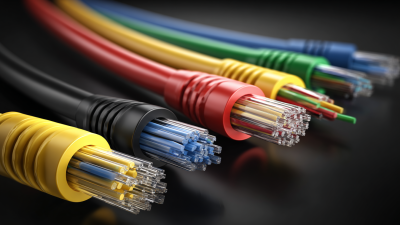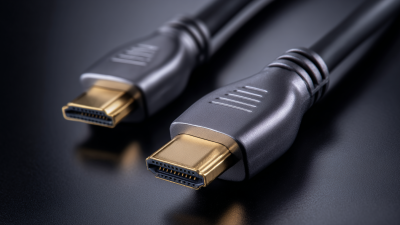Industries
Get direct access to our extensive portfolio of optical products and specialist technical expertise.
Get direct access to our extensive portfolio of optical products and specialist technical expertise.
In the rapidly evolving landscape of Industry 4.0, the demand for custom cable solutions is surging, driven by advancements in automation, IoT, and data analytics. According to a recent report by MarketsandMarkets, the global industrial automation market is projected to reach $295 billion by 2026, illustrating the critical role of tailored connectivity solutions.
Custom cables are becoming essential for optimizing machinery efficiency and ensuring seamless communication between devices. With an increasing number of manufacturers embracing smart technologies, the emphasis on versatility and precision in cable design is paramount.

Data from the International Federation of Robotics indicates that the number of operational industrial robots worldwide will exceed 3 million units by 2025, further highlighting the necessity for specialized cable solutions that can withstand the demands of high-performance applications.
As industries adapt to these technological trends, the future of custom cable lays the groundwork for enhanced productivity, reliability, and innovation.
The emergence of Industry 4.0 is revolutionizing the design and manufacturing of custom cable solutions. According to a recent report by Grand View Research, the global custom cable market is projected to reach $20.1 billion by 2025, driven by the increasing demand for automation and connectivity in various sectors. As industries integrate smart technologies, the need for specialized cable systems that can handle advanced data transmission protocols and enhance operational efficiency is paramount.
Data insights reveal that companies embracing Industry 4.0 technologies, such as the Internet of Things (IoT) and machine learning, are significantly improving their production capabilities. A report from McKinsey highlights that organizations utilizing predictive analytics in their manufacturing processes can reduce downtime by up to 30%. This shift not only necessitates more robust and versatile cable solutions but also prompts manufacturers to adopt flexible designs tailored to specific operational requirements, making adaptability and efficiency critical in the custom cable sector.
Moreover, the importance of sustainability in manufacturing processes cannot be overlooked. According to the International Energy Agency, the adoption of sustainable practices in production could reduce energy consumption in the cable manufacturing sector by nearly 25% by 2030. This trend emphasizes the need for innovative materials and environmentally friendly production methodologies, aligning with the core principles of Industry 4.0 and paving the way for the future of custom cable solutions.
The landscape of custom cable solutions is rapidly evolving, influenced by the rise of Industry 4.0. As businesses increasingly integrate smart technologies into their operations, the demand for high-quality, tailored cable products continues to rise. Significant trends include the push towards automation, IoT connectivity, and the need for advanced data transmission capabilities. These factors compel manufacturers to rethink their development strategies, ensuring they align with industry needs while also maintaining efficiency and cost-effectiveness.
Tip: When considering custom cable solutions, it’s essential to stay updated on technological advancements. Engage with your suppliers to discuss how your cable needs can evolve with emerging technologies.
Furthermore, sustainability has become a central theme within the industry. Companies are now prioritizing eco-friendly materials and manufacturing processes, reflecting consumers’ growing preference for environmentally responsible products. This trend not only addresses ecological concerns but can also enhance brand reputation and customer loyalty.
Tip: Incorporate sustainability into your cable sourcing strategy. Evaluate suppliers based on their environmental policies and practices to make informed decisions that resonate with your corporate values.
This chart illustrates the growth trends in various sectors driving the demand for custom cable solutions influenced by Industry 4.0 trends.
As industries embrace the advancements brought by Industry 4.0, the evolution of custom cable solutions is increasingly informed by data-driven insights. Leveraging sophisticated technologies such as AI for cable management is revolutionizing power networks, especially in regions such as Southeast Asia. This not only supports an energy transition but also maximizes operational efficiency, ensuring that resources align seamlessly with consumer demands.
Master data management plays a critical role in harnessing these insights, allowing organizations to effectively organize and access vital information about various entities, including customers and suppliers. By integrating data management practices, businesses can optimize their custom cable solutions, enhancing performance and reducing costs. The future will likely see further innovations in cable technology, driven by a confluence of AI, augmented reality, and advanced analytics, all aimed at elevating operational efficiency and transforming industry standards.
The advent of Industry 4.0 has significantly transformed various industries, and the realm of custom cable solutions is no exception. Central to this transformation are the technologies of the Internet of Things (IoT) and Artificial Intelligence (AI). IoT enables cables to communicate in real-time, collecting data that can be analyzed to optimize performance and enhance connectivity. Smart cables equipped with sensors can monitor their own conditions, alerting users to potential issues before they escalate into costly failures. This proactive approach promotes reliability in electrical systems, making custom solutions more efficient and tailored to individual needs.

AI plays a pivotal role in interpreting the vast amounts of data generated by IoT devices. By leveraging machine learning algorithms, businesses can forecast trends, understand usage patterns, and make informed decisions regarding cable design and manufacturing processes. This enhanced capability allows for the development of adaptive cable solutions that can self-adjust based on operational demands. As industries continue to evolve, the integration of IoT and AI into cable solutions promises to not only improve operational efficiency but also drive innovation in product offerings, paving the way for a smarter, more connected future.
The surge of Industry 4.0 has significantly impacted the custom cable manufacturing landscape, emphasizing the need for sustainable practices and innovations. With the global demand for industrial Ethernet switches projected to reach USD 6.8 billion by 2032, growing at a CAGR of 7.1%, manufacturers are increasingly prioritizing sustainable supply chains and environmentally friendly production methods. These innovations not only meet regulatory requirements but also cater to the consumer's rising demand for eco-conscious products.
Furthermore, the integration of artificial intelligence and machine learning within manufacturing processes is transforming operations for the better. By leveraging advanced technologies, companies can improve efficiency, reduce material waste, and enhance product quality. The exploration of hybrid manufacturing techniques, which often involve intricate cable solutions, highlights the necessity for versatile design capabilities in the production of custom cables. This drive toward innovation is crucial as businesses aim to stay competitive while simultaneously addressing environmental concerns.





